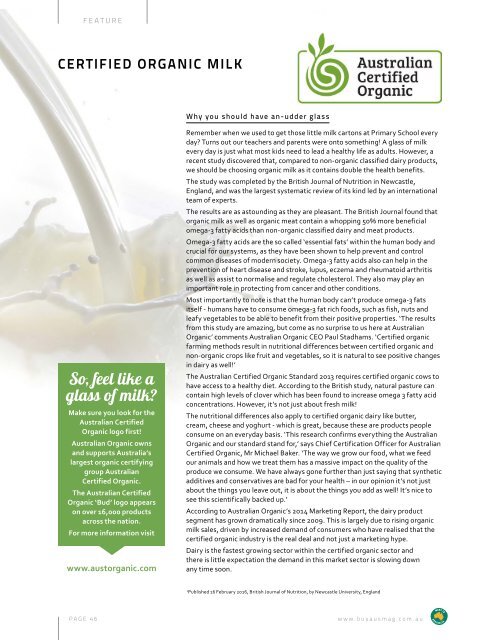Buy Australian Magazine June 2016
Create successful ePaper yourself
Turn your PDF publications into a flip-book with our unique Google optimized e-Paper software.
FEATURE<br />
CERTIFIED ORGANIC MILK<br />
Why you should have an-udder glass<br />
So, feel like a<br />
glass of milk?<br />
Make sure you look for the<br />
<strong>Australian</strong> Certified<br />
Organic logo first!<br />
<strong>Australian</strong> Organic owns<br />
and supports Australia’s<br />
largest organic certifying<br />
group <strong>Australian</strong><br />
Certified Organic.<br />
The <strong>Australian</strong> Certified<br />
Organic ‘Bud’ logo appears<br />
on over 16,000 products<br />
across the nation.<br />
For more information visit<br />
www.austorganic.com<br />
Remember when we used to get those little milk cartons at Primary School every<br />
day? Turns out our teachers and parents were onto something! A glass of milk<br />
every day is just what most kids need to lead a healthy life as adults. However, a<br />
recent study discovered that, compared to non-organic classified dairy products,<br />
we should be choosing organic milk as it contains double the health benefits.<br />
The study was completed by the British Journal of Nutrition in Newcastle,<br />
England, and was the largest systematic review of its kind led by an international<br />
team of experts.<br />
The results are as astounding as they are pleasant. The British Journal found that<br />
organic milk as well as organic meat contain a whopping 50% more beneficial<br />
omega-3 fatty acids than non-organic classified dairy and meat products.<br />
Omega-3 fatty acids are the so called ‘essential fats’ within the human body and<br />
crucial for our systems, as they have been shown to help prevent and control<br />
common diseases of modern society. Omega-3 fatty acids also can help in the<br />
prevention of heart disease and stroke, lupus, eczema and rheumatoid arthritis<br />
as well as assist to normalise and regulate cholesterol. They also may play an<br />
important role in protecting from cancer and other conditions.<br />
Most importantly to note is that the human body can’t produce omega-3 fats<br />
itself - humans have to consume omega-3 fat rich foods, such as fish, nuts and<br />
leafy vegetables to be able to benefit from their positive properties. ‘The results<br />
from this study are amazing, but come as no surprise to us here at <strong>Australian</strong><br />
Organic’ comments <strong>Australian</strong> Organic CEO Paul Stadhams. ‘Certified organic<br />
farming methods result in nutritional differences between certified organic and<br />
non-organic crops like fruit and vegetables, so it is natural to see positive changes<br />
in dairy as well!’<br />
The <strong>Australian</strong> Certified Organic Standard 2013 requires certified organic cows to<br />
have access to a healthy diet. According to the British study, natural pasture can<br />
contain high levels of clover which has been found to increase omega 3 fatty acid<br />
concentrations. However, it’s not just about fresh milk!<br />
The nutritional differences also apply to certified organic dairy like butter,<br />
cream, cheese and yoghurt - which is great, because these are products people<br />
consume on an everyday basis. ‘This research confirms everything the <strong>Australian</strong><br />
Organic and our standard stand for,’ says Chief Certification Officer for <strong>Australian</strong><br />
Certified Organic, Mr Michael Baker. ‘The way we grow our food, what we feed<br />
our animals and how we treat them has a massive impact on the quality of the<br />
produce we consume. We have always gone further than just saying that synthetic<br />
additives and conservatives are bad for your health – in our opinion it’s not just<br />
about the things you leave out, it is about the things you add as well! It’s nice to<br />
see this scientifically backed up.’<br />
According to <strong>Australian</strong> Organic’s 2014 Marketing Report, the dairy product<br />
segment has grown dramatically since 2009. This is largely due to rising organic<br />
milk sales, driven by increased demand of consumers who have realised that the<br />
certified organic industry is the real deal and not just a marketing hype.<br />
Dairy is the fastest growing sector within the certified organic sector and<br />
there is little expectation the demand in this market sector is slowing down<br />
any time soon.<br />
1<br />
Published 16 February <strong>2016</strong>, British Journal of Nutrition, by Newcastle University, England<br />
PAGE 46<br />
www.buyausmag.com.au


